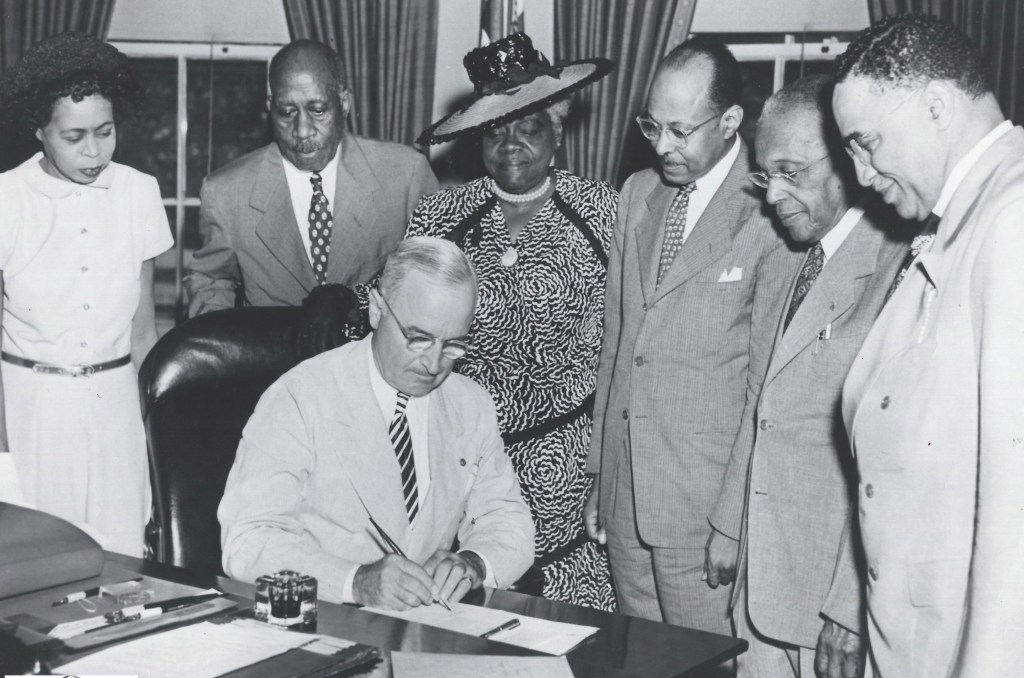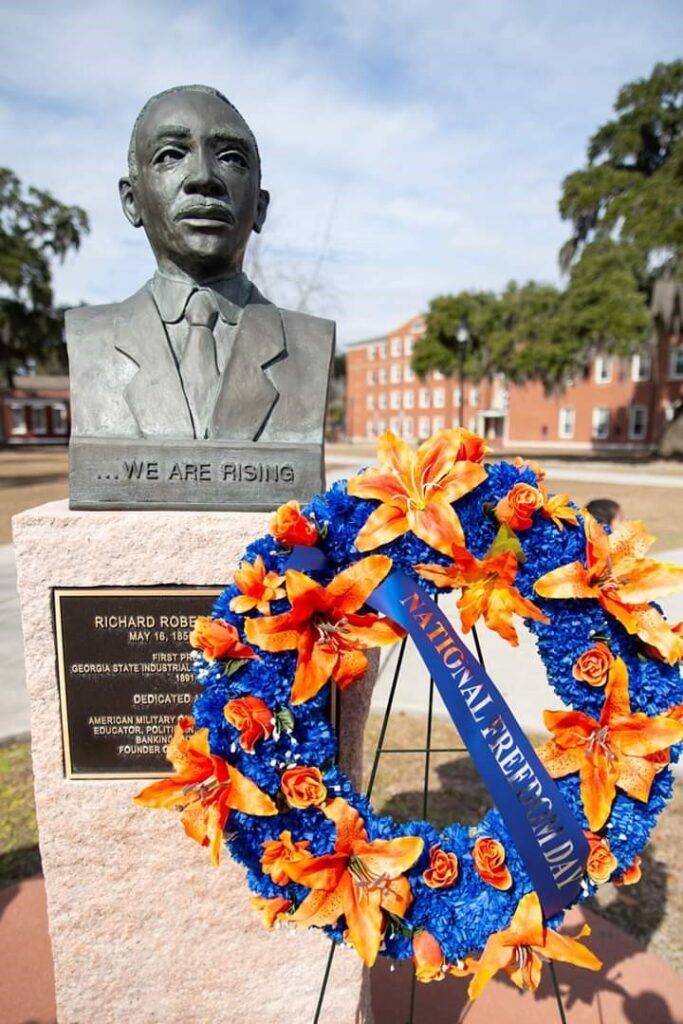Major Richard R. Wright, Sr. and National Freedom Day
by Ambassador Luis C.deBaca (ret.), Senior Justice Advisor, Grace Farms Foundation
Today, we celebrate National Freedom Day. Signed into law by President Harry S. Truman in 1948, this federal holiday commemorates the passage of the 13th Amendment for transmission to the states for ratification. Freedom Day isn’t as well-known as federal holidays that come with time off for work, but it is worthy of note and continued celebration, both because of its history and for what it can tell us about the ongoing fight against racism, the legacies of slavery, and contemporary forms of slavery and abuse.

Photo: President Harry S. Truman, 33rd President of the United States of America, signs the bill proclaiming February 1 National Freedom Day. Observing the signing in Washington, D.C. on June 3, 1948 are, left to right, Mrs. Harriet Wright Lemon, treasurer of the Citizens and Southern Bank & Trust Company of Philadelphia; Joseph E. Mitchell, editor of the St. Louis Argus; Mrs. Mary McLeod Bethune, president of the National Council of Negro Women of America; Emanuel Crogman Wright, president of Citizens and Southern Bank & Trust Company of Philadelphia; Dr. W.H. Jernagin, president of the National Sunday School, and Elder L. Michaux, president of the National Memorial to the Progress of the Colored Race of America. Photo credit: HBCU Library Alliance
Freedom Day was the culmination of a lifetime of work by Major Richard R. Wright, who was born in slavery and rose through the ranks of the U.S. Army, academic leadership, and banking. Major Wright first broke into the national consciousness in childhood, as the subject of a famous poem recounting his outspokenness during the 1868 visit of Freedmen’s Bureau Director O.O. (Oliver Otis) Howard to his school:
And he said: “Who hears can never
Fear for or doubt you;
What shall I tell the children
Up North about you?”
Then ran round a whisper, a murmur,
Some answer devising;
And a little boy stood up: “General,
Tell ’em we’re rising!”
— John Greenleaf Whittier: “Howard at Atlanta”
A Life of Distinction in Many Sectors
Major Wright excelled throughout his career, becoming the highest ranking African American in the U.S. military, president of the Historically Black Colleges and Universities (HBCU) land-grant institution now known as Savannah State University, and founder of a successful bank in Philadelphia. While the famous poem that featured his indomitable spirit culminated by urging Southern whites to consider the ending of slavery as an opportunity for all communities to rise together, Major Wright lived most of his life in a South that was insistent on undoing the gains of post-War legislation and social advancement. As an educator, he battled for resources to provide a university education for Black students rather than settling for simply vocational training, becoming part of an early network of leaders who realized the power of national political engagement.
Knowing that he had political access and adamant that Black Americans deserved to take their place in the U.S. polity, Major Wright harnessed the tools of memory and memorialization (through postage stamps), war memorials, and ultimately Freedom Day) as a way of claiming social and political status for the Black community and to preserve the legacy of those who had lived in slavery and thrown off their bonds. It was not an easy task; the proposal was defeated in Congress by white Southern politicians before finally becoming law a year after Major Wright’s death.
National Freedom Day
Since the 1940s, Freedom Day has been commemorated in Philadelphia at an annual wreath-laying at the Liberty Bell (itself a symbol of the abolitionist movement), with the list of speakers and attendees reading like a “Who’s Who” of the Civil Rights Movement and 20th Century Black political and religious leadership. This year’s event, which will feature essay contest winners and student readings of the Thirteenth, Fourteenth, and Fifteenth Amendments, can be live-streamed at 6:00 EST and at the SSU Student Life YouTube Channel.
By the early 2000s, the Freedom Day movement had lost some of that centrality in the national consciousness. The annual commemoration has continued locally but as generations passed the celebration was subsumed into broader national programming, especially with the establishment of February as Black History Month. In recent years, Emancipation celebrations are gravitating to what had previously been a different localized celebration: Juneteenth, which commemorates not only Emancipation, but the many years it took to be proclaimed in Texas.
It is appropriate that commemorations of the freedom struggle be fluid and inclusive of other celebrations, for Emancipation was not a one-time event but set forth the challenge of an ongoing struggle. So too, the Thirteenth Amendment and the other Civil Rights Amendments to the Constitution were not self-executing but must be defended against those who would twist them for their own ends to justify discrimination, incarceration, and voter suppression.
In 2010, President Barack Obama revived the Freedom Day commemoration as part of his on-going efforts to confront contemporary forms of slavery. Under his leadership, Freedom Day became one of the anchors of National Slavery and Human Trafficking Prevention Month, which runs from January 1 (the effective date of Emancipation in 1863 and a holiday long marked in Black communities by parades and still anticipated in Watch Night gatherings in the Black Church) and ends on National Freedom Day (the day the 13thAmendment was signed).
So too, it has become practice to release the annual Trafficking in Persons Report as close to June 19 as possible, to make Juneteenth’s commemoration of the long-delayed announcement of freedom into a challenge for current action. The genesis of Freedom Day, having been conceived and made a reality by survivors of chattel slavery and their children, is in keeping with the current imperative to bring survivor leadership and voices into the modern anti-trafficking fight.

Major Wright’s legacy lives on not just through National Freedom Day, but in the communities that have been strengthened through the institutions that he built, such as Savannah State University. © Savannah State University
Ending Modern Slavery
So we commemorate 2021’s National Slavery and Human Trafficking Prevention Month not only by reflecting on Grace Farms’ efforts against this scourge and recommitting ourselves to incorporating anti-slavery efforts into construction and design through sectoral and academic engagement, but also by centering our actions in the anti-racism work that we have identified as a priority. In so doing, we hope to not only honor the experiences of survivors and workers combatting human trafficking today, but to advance the memory of survivor advocates of the past. Through our actions insisting on it becoming a reality, we can remember and memorialize Richard R. Wright’s vision of the United States as a force for freedom.
– Ambassador Luis C.deBaca (ret.), who coordinated U.S. activities in the fight against contemporary forms of slavery under President Obama, is Senior Justice Advisor to Grace Farms. At Yale University, he teaches on historical and modern uses of the 13th Amendment, slaveries as manifested in building materials supply chains, and slavery and its legacies in memory and memorialization.

